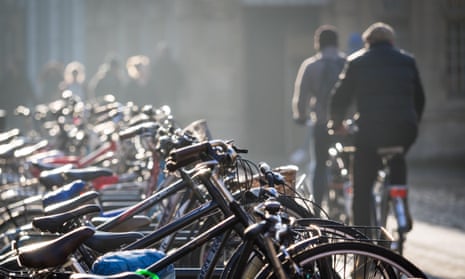If a country wants to make things, it needs a domestic steel industry. Our government considers this industry to be one of national strategic importance. But you would think it was also important to keep people moving, to make sure the air they breathe is clean and to look after their health.
It just so happens that cycling is one of the ways to unsnarl traffic congestion, reduce pollution and make folks hale and hearty. People who cycle to work even have fewer days off sick.
But the cycle industry isn’t currently considered in any strategic sense by our government. That needs to change, argues a new report, The Value of the Cycling Sector to the British Economy, commissioned by the Bicycle Association. The report, launched this week in London’s Guildhall, reveals that the UK cycle industry is no pipsqueak: it is actually worth three times more than the UK steel industry, and employs twice as many people.Cycling-related businesses generate at least £5.4bn for the UK economy each year, and they sustain 64,000 jobs – some in bike shops, but most in cycle tourism of one sort or the other.
Authors of the report, Carey Newson and Lynn Sloman of the sustainable transport consultancy Transport for the Quality of Life, estimate that a bicycle is sold roughly every 10 seconds.
The Bicycle Association is using the report’s findings to make an “industrial case” for cycling.
And Brexit could be the way in. The government is desperate to develop an “industrial strategy” that demonstrates our potential, both domestically and globally. It clearly doesn’t know it yet, but cycling ticks many of the government’s boxes. For instance, the government has identified the “future of mobility” as one of the four grand challenges for raising the UK’s dire productivity.
But ministers and mandarins alike still think of mobility in terms of third runways, “smart” motorways and driverless cars. Yet even the cleverest and fastest of smart and fast transport modes – think Teslas, if you wish – grind to a halt in spatially constrained city centres. The bicycle does not.
And it hasn’t been grinding to a halt for 200 years. The modern cycle was developed from a “running machine” that first hit London’s streets in December 1818, and this is being commemorated at the International Cycle History Conference at Guildhall this week. The Bicycle Association’s industrial strategy report has been launched in front of industry types – and MPs and mandarins – at this afternoon’s session of the conference. Delegates have also been pointed to a new website – 200yearsofthebicycle.com – which I produced for the Bicycle Association. I superimposed modern cyclists on to period photographs to flag the fact that the “past informs the future”. The report’s strategic benefits are actually quite conservative; they do not include cycling’s financial contribution to mitigating climate change damage, reducing morbidity, improving mental health and boosting the wellbeing of children – adding in those factors would likely add a further £3bn of benefits, report Newson and Sloman. Even more would be added if sporting events, such as the Tour de Yorkshire, were also included.
The report estimates that there is a 4:1 “ethical return” when consumers purchase bicycles. In other words, for every pound spent on a bicycle, the wider economy benefits by £4. (This is calculated from net gains thanks to improved health, reduced congestion and cleaner air.) So, the sale of a £450 bicycle generates national economic benefits of around £1,800. (Got a snazzy carbon-composite bicycle? Congrats, you’ve *really* helped the economy.)
The report points out that if the government meets its own target to double cycle usage by 2025, then cycling will deliver a £10bn boost to the economy, sustaining more than 100,000 jobs.
“The UK has the opportunity to lead the world,” the Bicycle Association operations director, Steve Garidis, told conference delegates.
“We can make the use of smart, clean bikes and e-cargo bikes a key part of a new green transport system which can power our future economy. More cycling also has the potential to stimulate the economies of our cities, making them function better.”
He added that this stimulation also has a high-tech element because “by making towns and cities more attractive places for the tech industry to locate, they will be able to attract a highly skilled, dynamic workforce.”
Trump’s tariffs on Europe’s steel and aluminium may be focussing Brexit-addled minds at the minute but in the long run, the smart money should go on a clean, ethical, health-promoting industry that has a bigger clout than most people think.

